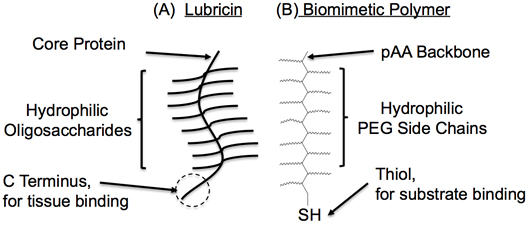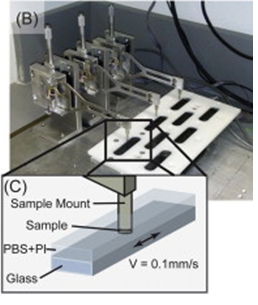Motivation
Proper lubrication of articular cartilage is essential to joint health. In arthritic joints or after traumatic injury, lubrication is impaired and can promote cartilage damage. Our lab studies cartilage lubrication mechanisms and therapies for treating osteoarthritis (OA). We have a custom-built tribometer, which we we use to measure friction coefficients of cartilage.
Current Research
Our current research is aimed at:
- Lubricin mimetic polymers for improving cartilage lubrication [Collaborations: Putnam Lab (Cornell); Dr. Scott Rodeo (Hospital for Special Surgery)]
- Lubrication mechanisms and clinical applications of intra-articular hyaluronic acid injections for treating arthritis [Collaborations: Fidia Pharma; Hospital for Special Surgery; University of Padua]
- Improving lubrication of tissue engineered constructs including meniscus and cartilage grafts [Collaboration: Histogenics Corp.; Hospital for Special Surgery]
- Alteration in lubrication in different animal injury models [Collaborations: Reesink Lab (Cornell)]
Lab Members
Collaborations
Dr. Scott Rodeo – Hospital for Special Surgery, New York, NY
Fidia Pharma – Parsippany, NJ
Histogenics Corp. – Waltham, MA
Hospital for Special Surgery – New York, NY
Putnam Lab – Cornell University, Ithaca, NY
Reesink Lab – Cornell University, Ithaca, NY
University of Padua – Padua, Italy
Photograph and diagram of custom tribometer.

Diagram of natural lubricin protein (A) and the biomimetic polymer (B), which share a hydrophilic brush structure. Taken from: Samaroo et. al. (2013). Characterization of binding and lubricating properties of biomimetic boundary lubricants for articular cartilage. Orthopaedic Research Society 2013 Annual Meeting. Paper No. 0392. See also: Samaroo et. al. (2016), Binding and lubrication of biomimetic boundary lubricants on articular cartilage. Journal of Orthopaedic Research.

